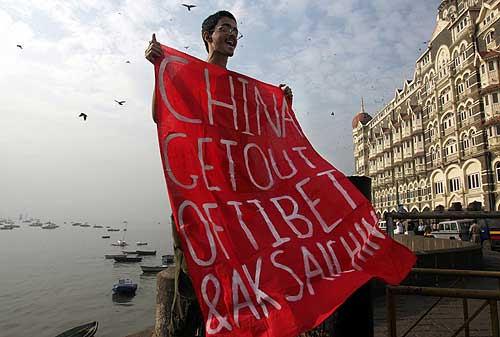|

Hu Jintao Protest in Hyderabad
(By www.andhracafe.com | November 24, 2006)

November 23, 2006: Shibayan Raha, Campaigns Coordinator of Friends of Tibet unfurls the banner reading: "China Get Out of Tibet and Aksai Chin" outside the Taj Hotel, Bombay on November 23, 2006 just before Chinese President Hu Jintao's speech at the India-China Economic, Trade and Investment Cooperation Summit. (Photo: Vikas Khot/Hindustan Times)
Hyderabad: The Hyderabad Regional Tibetan Youth Congress and the Organiastion of Friends of Tibet organised demonstration here in support of 'Free Tibet' and against the Chinese policies on Tibet.
The protest were organised in the wake of Chinese president Hu-Jintao's arrival in India. Lobsang Nyandak, president of Regional Tibetan Youth, said that
the constant cracked down on monasteries and suppression of Tibetan culture was making the Tibetans aliens in their own land. He said that resolving the
Tibetan issue was key to dealing with the Chinese stand on Arunachal Pradesh, a security concern for India. Both the organisations demanded tha the
Chinese President create a conducive atmosphere and hold talks with Dalai Lama for resolving the Tibetan issue.

'Freedom to Dissent'
(Times of India Editorial | November 21, 2006)
India seems to be taking the maxim Atithi Devo Bhava too literally. Ahead
of the Chinese president's visit, the ministry has gone into overdrive to
sanitise New Delhi of Tibetan protestors. First, the police ordered
Friends of Tibet activist, Tenzin Tsundue, to stay put in Dharamsala until
Hu Jintao returned to Beijing. Now, there are reports of the police asking
Tibetan exiles to stay away from the city centre, fearing them to be a
security threat. Such gagging of peaceful political protests is
inappropriate. New Delhi has officially accepted China's occupation of
Tibet, but it has no business to demand that all sections of the civil
society should toe the line.
Certainly, Beijing wouldn't be pleased at the sight of Shame China
placards in the capital during Hu's visit. That's not at all surprising
since China has no claims to be a democracy. The freedom to protest is an
essential sign of an open society. India rightfully claims to be one. No
government in India is spared of criticism, and the Indian state, in
principle, and most often in practice as well, respects the right of
citizens to dissent peacefully and demonstrate against official policies.
There is no need to make any exception to it even when the target of
protest is a visiting head of state.
India and China do have common economic interests, but our political
systems have little in common. New Delhi is one up on Beijing in having a
democratic form of government, and can justifiably be proud of giving
asylum to political refugees including those from Tibet. The success of
the Chinese economy has prompted many to gloss over the rampant human
rights violations in that country. Friends of China, like the CPM which
opposes abuse of human rights by countries like the US in Iraq and Latin
America, should advise Beijing on the importance of political and social
freedoms.
This underbelly of China is manifest in the large number of executions in
that country. Amnesty International has reported that 84 per cent of
globally documented executions are carried out in China; over 18,000
people were put to death in the 1990s. Some estimates claim that the
average number of judicial and extrajudicial executions between 1997 and
2001 were anywhere between 10,000 and 15,000.
With a conviction rate of 99 per cent and state-promoted fast-track
justice-dispensing mechanisms like mobile execution vans, China appears to
be caught in a time warp. Perhaps, Hu should take a few lessons in
combining Marxist rhetoric and liberal democracy from his comrades in CPM.
Hu Jintao protests in Bombay was organised by Tibetan Youth Congress, Friends of Tibet and United Tibetan Association of Maharashtra and Gujarat on November 23, 2006.
|